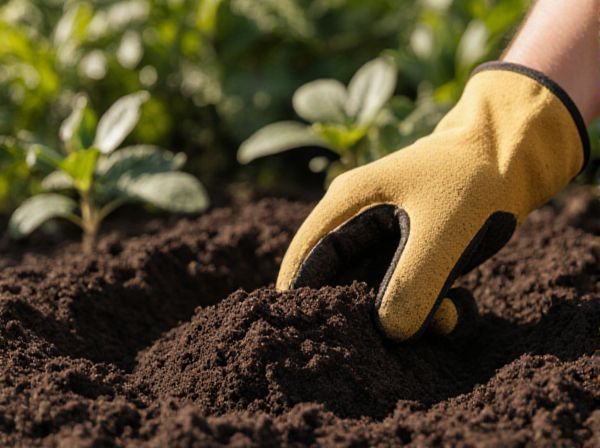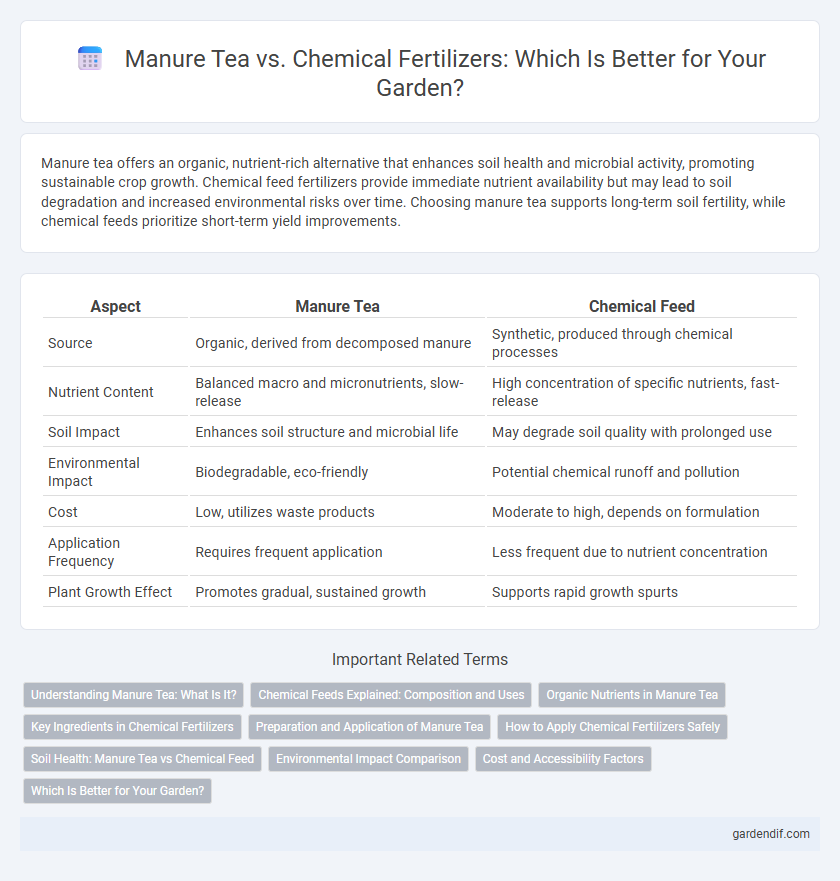
Manure tea vs Chemical feed Illustration
Manure tea offers an organic, nutrient-rich alternative that enhances soil health and microbial activity, promoting sustainable crop growth. Chemical feed fertilizers provide immediate nutrient availability but may lead to soil degradation and increased environmental risks over time. Choosing manure tea supports long-term soil fertility, while chemical feeds prioritize short-term yield improvements.
Table of Comparison
| Aspect | Manure Tea | Chemical Feed |
|---|---|---|
| Source | Organic, derived from decomposed manure | Synthetic, produced through chemical processes |
| Nutrient Content | Balanced macro and micronutrients, slow-release | High concentration of specific nutrients, fast-release |
| Soil Impact | Enhances soil structure and microbial life | May degrade soil quality with prolonged use |
| Environmental Impact | Biodegradable, eco-friendly | Potential chemical runoff and pollution |
| Cost | Low, utilizes waste products | Moderate to high, depends on formulation |
| Application Frequency | Requires frequent application | Less frequent due to nutrient concentration |
| Plant Growth Effect | Promotes gradual, sustained growth | Supports rapid growth spurts |
Understanding Manure Tea: What Is It?
Manure tea is a liquid fertilizer made by steeping organic manure in water, extracting essential nutrients such as nitrogen, phosphorus, and potassium in a bioavailable form. Unlike chemical feed fertilizers that rely on synthesized compounds, manure tea provides a natural and sustainable nutrient source that improves soil microbiota and enhances plant growth. This organic liquid fertilizer supports eco-friendly agriculture by recycling waste while minimizing chemical runoff and soil degradation.
Chemical Feeds Explained: Composition and Uses
Chemical feeds typically consist of concentrated nutrients such as nitrogen, phosphorus, and potassium, sourced from synthetic compounds to promote rapid plant growth. These feeds are formulated to deliver precise nutrient ratios tailored to specific crop needs, enhancing efficiency and yield consistency. Their widespread use in commercial agriculture enables targeted soil enrichment, although management is required to prevent environmental runoff and nutrient imbalances.
Organic Nutrients in Manure Tea
Manure tea is rich in organic nutrients such as nitrogen, phosphorus, and potassium, which are essential for sustainable plant growth and soil health. Unlike chemical feeds that provide synthetic nutrients, manure tea enhances microbial activity and improves soil structure by supplying natural humic substances and beneficial microorganisms. This organic nutrient profile promotes long-term fertility and reduces the risk of chemical runoff and soil degradation.
Key Ingredients in Chemical Fertilizers
Chemical fertilizers primarily contain key ingredients such as nitrogen, phosphorus, and potassium, which are essential macronutrients for plant growth and development. These ingredients are often synthesized in concentrated forms to provide specific nutrient ratios tailored to different crop needs. Unlike manure tea, chemical fertilizers deliver nutrients quickly and predictably, enhancing soil fertility with precise nutrient availability.
Preparation and Application of Manure Tea
Manure tea is prepared by steeping well-aged animal manure in water for several days, creating a nutrient-rich liquid fertilizer that releases nutrients gradually and enhances soil microbial activity. Its application involves diluting the tea before evenly applying it to the soil or plants, ensuring nutrients are absorbed efficiently without burning roots. This natural method contrasts with chemical feeds, which deliver nutrients instantly but may cause soil degradation and require careful handling.
How to Apply Chemical Fertilizers Safely
Apply chemical fertilizers by following the recommended dosage on the product label to prevent nutrient overload and soil contamination. Use protective gear such as gloves and masks to minimize direct exposure to harmful chemicals during handling. Incorporate fertilizers into the soil evenly to reduce runoff into water sources and enhance nutrient absorption by plants.
Soil Health: Manure Tea vs Chemical Feed
Manure tea enriches soil with organic matter and beneficial microbes, improving soil structure and nutrient availability, unlike chemical feed which may lead to nutrient imbalances and soil degradation over time. The natural composition of manure tea supports microbial diversity essential for healthy soil ecosystems, enhancing water retention and aeration. In contrast, prolonged use of chemical fertilizer can disrupt microbial activity, reduce soil organic matter, and increase dependency on synthetic inputs.
Environmental Impact Comparison
Manure tea releases essential nutrients slowly, enhancing soil microbial activity and reducing chemical runoff that harms aquatic ecosystems. Chemical fertilizers provide immediate nutrient availability but often lead to soil degradation, water pollution through nitrogen and phosphorus leaching, and increased greenhouse gas emissions. Sustainable farming benefits from manure tea's lower environmental footprint by promoting natural nutrient cycling and minimizing contamination risks.
Cost and Accessibility Factors
Manure tea offers a cost-effective and sustainable alternative to chemical feed, utilizing readily available organic waste materials that reduce expenses for farmers. Chemical fertilizers typically require higher upfront investment and depend on industrial production and supply chains, which can limit accessibility in remote or low-income regions. The affordability and ease of preparation make manure tea a practical solution for small-scale and resource-limited agricultural operations.
Which Is Better for Your Garden?
Manure tea enriches soil with organic nutrients and beneficial microbes, promoting sustainable garden health and improved soil structure. Chemical feed delivers precise nutrient ratios for fast plant growth but may cause long-term soil degradation and environmental harm. Choosing manure tea supports eco-friendly gardening, while chemical feed suits immediate nutrient demands, depending on garden goals.
Manure tea vs Chemical feed Infographic

 gardendif.com
gardendif.com